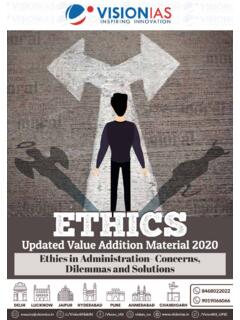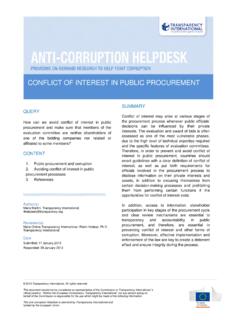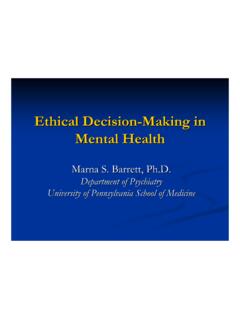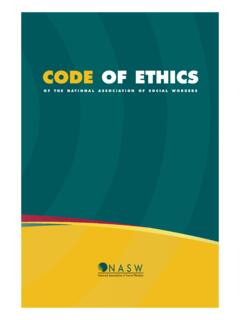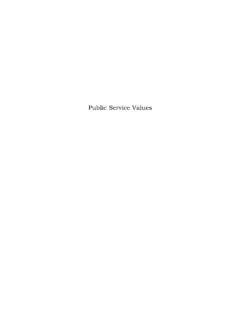Transcription of Hygienists’ of - CDHA
1 } Revised June 2012ofHygienists 2 June 2012 CodeofEthics}Preamble ethical principlesPrinciples and responsibilitiesPrinciple 1: BeneficencePrinciple 2: AutonomyPrinciple 3: IntegrityPrinciple 4: AccountabilityPrinciple 5: ConfidentialityAppendix A: ethical challengesAppendix B: Guidelines for ethical decision makingAppendix C: Guidelines for reporting suspectedBibliography Tableofcontents345-956789 10 11-12 1314-15 unethical conduct3 June 2012 CodeofEthicsPreambleThe CDHA Code of Ethics sets out the ethical principles and responsibilities which apply to all members of the dental hygiene profession across all practice areas including clinical care, education, research, administration and any other role related to the profession of dental is the study of moral values and moral reasoning. ethical codes are formal statements that guide members of a profession in their obligations to clients, colleagues, the larger society, and to global health.
2 * The Code of Ethics serves to:Articulate the ethical principles and responsibilities by which dental hygienists are guided and under which they are accountable; Provide a professional resource for education, reflection, self-evaluation, and peer review within dental hygiene and the broader health care community; Inform the public about the ethical principles and responsibilities of the dental hygiene profession. Dental hygienists primary responsibility is to the client. In this document, client refers to a person or persons or a community with whom dental hygienists are engaged in a professional relationship. These relationships occur in all areas of dental hygiene practice including clinical services ( , private dental offices, independent practice, schools, community/public health clinics, acute and long term care, corporate environments); education, research, regulatory and policy roles; and hygienists work in an interprofessional collaborative environment.
3 They are accountable to other codes of ethics/ ethical guidelines including those of their provincial/territorial regulatory authority and their workplace. The CDHA Code of Ethics is a strong foundational document, effective on its own, and complementary to other ethical codes that address more specific situations and behaviours. Dental hygienists use the Code of Ethics in conjunction with professional standards, workplace policies, and laws and regulations that guide practices and behaviours. In achieving these requirements, they fulfill their contract with society to meet a high standard of ethical practice.* Global Health is the health of populations in a global context and transcends the perspectives and concerns of individual nations. The World Health Organization and the Transition from International to Global Public Health. Brown et al., AJPH: Jan 2006, Vol 96, No 1.
4 June 2012 CodeofEthics Principle: BeneficenceBeneficence involves caring about and acting to promote the good of another. Dental hygienists use their knowledge and skills to assist clients to achieve and maintain optimal oral health and overall wellbeing, and to promote fair and reasonable access to quality oral health services as an integral part of the healthcare : AutonomyAutonomy pertains to the right to make one s own choices. By communicating relevant information openly and truthfully, dental hygienists assist clients to make informed choices and to participate actively in achieving and maintaining their optimal oral health. Principle: IntegrityIntegrity relates to consistency of actions, values, methods, expectations, and outcomes. It includes the promotion of fairness and social justice with consideration for those clients more vulnerable. It conveys a sense of wholeness and strength, and doing what is right with honesty and truthfulness.
5 Principle: AccountabilityAccountability pertains to taking responsibility for one s actions and omissions in light of relevant principles, standards, laws, and regulations. It includes the potential to self evaluate and be evaluated. It involves practising competently and accepting responsibility for behaviours and decisions in the professional : ConfidentialityConfidentiality is the duty to hold secret any information acquired in the professional relationship. Dental hygienists respect a client s privacy and hold in confidence information disclosed to them except in certain narrowly defined exceptions. 1 ethical PrinciplesThe Principles depict the broad ideals to which dental hygienists aspire and which guide their practice. The Responsibilities outlined on the following pages are more precise and provide direction for behaviours in ethical June 2012 CodeofEthicsPrinciples and ResponsibilitiesPrinciple: BeneficenceBeneficence involves caring about and acting to promote the good of another.
6 Dental hygienists use their knowledge and skills to assist clients to achieve and maintain optimal oral health and overall wellbeing, and to promote fair and reasonable access to quality oral health services as an integral part of the healthcare for BeneficenceDental hygienists put the needs, values, and interests of clients hygienists provide services to clients in a caring manner with respect for their individual needs, values, culture, safety, and life circumstances, and in recognition of their inherent hygienists regard informed choice as a precondition of intervention, and honour a client s informed choice including refusal of intervention. Dental hygienists recommend or provide those services that they believe are necessary for promoting and maintaining a client s oral health and its effect on total body health and wellness, and which are consistent with the client s informed hygienists take appropriate action to ensure a client s safety and quality of care when they suspect unethical or incompetent hygienists seek to improve the quality of care, and advance knowledge in the field of oral health through advocacy and interprofessional June 2012 CodeofEthicsPrinciple: AutonomyAutonomy pertains to the right to make one s own choices.
7 By communicating relevant information openly and truthfully, dental hygienists assist clients to make informed choices and to participate actively in achieving and maintaining their optimal oral health. Responsibilities for AutonomyDental hygienists actively involve clients in their oral healthcare and promote informed choice by communicating relevant information openly, truthfully, and sensitively in recognition of their needs, values, and capacity to understand. Dental hygienists Involve and promote informed choice by substitute decision maker(s) in situations where clients lack the capacity for informed hygienists In the event of a substitute decision maker, involve clients to the extent of their hygienists Recognize cultural differences, and assess and plan interventions with individuals and populations receiving their services relative to the cultural June 2012 CodeofEthicsPrinciple: IntegrityIntegrity relates to consistency of actions, values, methods, expectations, and outcomes.
8 It includes the promotion of fairness and social justice, with consideration for those clients more vulnerable. It conveys a sense of wholeness and strength, and doing what is right with honesty and for IntegrityDental hygienists uphold the principles and standards of the profession with clients, colleagues and others with whom they are engaged in a professional relationshipDental hygienists maintain and advance their knowledge and skills in dental hygiene through lifelong hygienists provide quality of interventions through ongoing self evaluation and quality hygienists promote conditions that enable social, economic, cultural values and institutions compatible with meeting basic human rights and dignity. Dental hygienists collaborate with colleagues in a cooperative, constructive and respectful manner with the primary goal of providing safe, competent, fair and high quality interventions to individuals, families and hygienists promote workplace practices and policies that facilitate professional practice in accordance with the principles, standards, laws and regulations under which they are accountable.
9 Dental hygienists communicate the nature and costs of professional services fairly and accurately, adhering to guidelines and/or regulations for advertising as outlined by their jurisdictional regulatory authority. 12345678 June 2012 CodeofEthicsPrinciple: AccountabilityAccountability pertains to taking responsibility for one s actions and omissions in light of relevant principles, standards, laws, and regulations. It includes the potential to self evaluate and to be evaluated. It involves practising competently and accepting responsibility for behaviours and decisions in the professional for AccountabilityDental hygienists accept responsibility for knowing and acting consistently with the principles, practice standards, laws and regulations under which they are hygienists practise within the bounds of their competence, scope of practice, personal and/or professional limitations.
10 Dental hygienists refer clients who require services outside their scope of practice to the appropriate hygienists address issues in the practice environment that may hinder or impede the provision of care. Dental hygienists inform their employers about the principles, standards, laws and regulations to which dental hygienists are accountable and determine whether employment conditions facilitate safe professional hygienists inform their employers and/or appropriate regulatory authority of unethical practice by a colleague (see Appendix C). Dental hygienists inform the appropriate regulatory authority in the event of becoming unable to practise safely and June 2012 CodeofEthicsPrinciple: ConfidentialityConfidentiality is the duty to hold secret any information acquired in the professional relationship. Dental hygienists respect a client s privacy and hold in confidence information disclosed to them except in certain narrowly defined for ConfidentialityDental hygienists demonstrate respect for the privacy of hygienists promote practices, policies and information systems that are designed to respect and protect clients privacy and hygienists understand and respect the potential of compromising confidentiality when connecting with clients through social networks or other electronic media.

